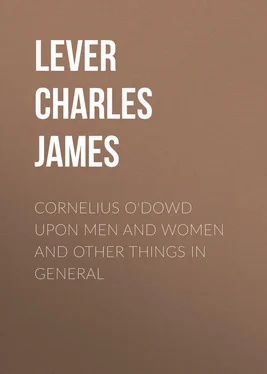Charles Lever - Cornelius O'Dowd Upon Men And Women And Other Things In General
Здесь есть возможность читать онлайн «Charles Lever - Cornelius O'Dowd Upon Men And Women And Other Things In General» — ознакомительный отрывок электронной книги совершенно бесплатно, а после прочтения отрывка купить полную версию. В некоторых случаях можно слушать аудио, скачать через торрент в формате fb2 и присутствует краткое содержание. Издательство: Иностранный паблик, Жанр: literature_19, foreign_antique, foreign_prose, на английском языке. Описание произведения, (предисловие) а так же отзывы посетителей доступны на портале библиотеки ЛибКат.
- Название:Cornelius O'Dowd Upon Men And Women And Other Things In General
- Автор:
- Издательство:Иностранный паблик
- Жанр:
- Год:неизвестен
- ISBN:нет данных
- Рейтинг книги:4 / 5. Голосов: 1
-
Избранное:Добавить в избранное
- Отзывы:
-
Ваша оценка:
- 80
- 1
- 2
- 3
- 4
- 5
Cornelius O'Dowd Upon Men And Women And Other Things In General: краткое содержание, описание и аннотация
Предлагаем к чтению аннотацию, описание, краткое содержание или предисловие (зависит от того, что написал сам автор книги «Cornelius O'Dowd Upon Men And Women And Other Things In General»). Если вы не нашли необходимую информацию о книге — напишите в комментариях, мы постараемся отыскать её.
Cornelius O'Dowd Upon Men And Women And Other Things In General — читать онлайн ознакомительный отрывок
Ниже представлен текст книги, разбитый по страницам. Система сохранения места последней прочитанной страницы, позволяет с удобством читать онлайн бесплатно книгу «Cornelius O'Dowd Upon Men And Women And Other Things In General», без необходимости каждый раз заново искать на чём Вы остановились. Поставьте закладку, и сможете в любой момент перейти на страницу, на которой закончили чтение.
Интервал:
Закладка:
THE STRANGER AT THE CROCE DI MALTA
At the Croce di Malta, where we stopped – the Odessa, we heard, was atrociously bad – we met a somewhat depressed countryman, whose familiarity with place and people was indicated by several little traits. He rebuked the waiter for the salad oil, and was speedily supplied with better; he remonstrated about the wine, and a superior “cru” was served the day following. The book of the arrivals, too, was brought to him each day as he sat down to table, and he grunted out, I remember, in no very complimentary fashion as he read our names, “Nobodies.”
My Garibaldian friend had gone over to Massa, so that I found myself alone with this gentleman on the night of my arrival; for, when the company of the table-d’hôte withdrew, he and I were discovered, as the stage-people say, seated opposite to each other at the fire.
It blew hard without; the sea beat loudly on the shingly shore, and even sent some drifts of spray against the windows; while within doors a cheerful wood-fire blazed on the ample hearth, and the low-ceilinged room did not look a whit the worse that it suggested snugness instead of splendour. I had got my cup of coffee and my cognac on a little table beside me; and while I filled the bowl of my pipe, I bethought me how cheap and come-at-able are often the materials of our comfort, if one had but the prudence which ignores all display. My companion, apparently otherwise occupied in thought, sat gazing moodily at the fire, and to all seeming unaware of my presence.
“Will my smoking annoy you, sir?” asked I, as I was ready to begin.
“No,” said he, without looking up. “I’d like to know where one could go to live nowadays if it did.”
“Very true,” said I; “the practice is almost universal”
“So is child-murder, so is profane swearing, so is wearing a beard, and poisoning by strychnine.”
I was somewhat struck by his enumeration of modern atrocities, and I said, in a tone intended to invite converse, “You are no admirer, then, of what some are fain to call progress?”
He started, and, turning a fierce sharp glance on me, said, “I’d rather you’d touch me with that hot poker there, sir, than hurl that hateful word at my ears. If there’s a thing I hate the most, it’s what cant – a vile modern slang – calls ‘Progress.’ You’re just in the spot at this moment to mark one of its high successes. Do you know Spezia?” “Not in the least; never was here before.” “Well, sir, I have known it, I’ll not stop to count how many years; but I knew it when that spot yonder, where you see that vile tall chimney, with its tail of murky smoke, was a beautiful little villa, all overgrown with fig and olive trees. Where you perceive that red glare – the flame of a smelting furnace – there was an orangery. I ought to know the spot well. There, where a summerhouse stood, on that rocky point, they have got a crane and a windlass. Now, turn to this other side. The road you saw to-day, crossed with four main lines, cut up, almost impassable between mud, rubbish, and fallen timber, with swampy excavations on one side and brick-fields on the other, led – ay, and not four years ago – along the margin of the sea, with a forest of chestnuts on the other side, two lines of acacias forming a shade along it, so that in the mid-day of an Italian July you might walk it in delicious shadow. In the Gulf itself the whole scene was mirrored, and not a headland, nor rock, nor cliff, that was not pictured below. It was, in a word, a little paradise; nor were the people all unworthy of their lovely birthplace. They were a quiet, civil, obliging, simple-minded set – if not inviting strangers to settle amongst them, never rude or repelling to them; equitable in dealings, and strange to all disturbance or outrage. What they are now is no more easy to say than what a rivulet is when a torrent has carried away its banks and swept its bed. Two thousand navvies, the outsweepings of jails and the galleys, have come down to the works; a horde of contractors, sub-contractors, with the several staffs of clerks, inspectors, and suchlike, have settled on the spot, ravaging its beauty, uprooting its repose, vulgarising its simple rusticity, and converting the very gem of the Mediterranean into a dreary swamp – a vast amphitheatre, where liberated felons, robbing contractors, foul miasma, centrifugal pumps, and tertian fevers, fight all day for the mastery. And for what? – for what? To fill the pockets of knavish ministers and thieving officials – to make an arsenal that will never be finished, for a fleet that will never be built.” My companion, it is needless to say, was no optimist; but the strange point was, that while he was unsparing of his censure on Cavour and the “Piedmontese party,” he was no apologist for the old state of things in Italy. So far from it, that he launched out freely in attack of Papal bigotry, superstition, and corruption, and freely corroborated our own Premier’s assertions, by calling the Pope’s the “worst government in Europe.” In fact, he showed very clearly that the smaller states of Italy were well or ill administered in the direct ratio that they admitted or rejected Papal interference, – Modena being the worst, and Tuscany the best of them.
Though he certainly knew his subject so far as details went – for he not merely knew Italy well in its several provinces, but he understood the characters and tempers of the leading Italians – yet, with all this, I could not help asking him, If he was not satisfied with the old Italy, and yet did not like the new, what he did wish for?
“I have my theory on that subject, sir,” said he; “nor am I the less enamoured of it that I never yet met the man I could induce to adopt it.”
“It is no worse than the fate of all discoverers, I suppose,” said I; “Columbus saw land two whole days before his followers.”
“Columbus was a humbug, sir, and no more discovered America than you did.”
I was so afraid of a digression here that I stammered out a partial concurrence, and asked for some account of his project for Italy.
“I’d unite her to Greece, sir. These people, with the exception of a small circle around Rome, are not Latins – they are Greeks. I’d bring them back to the parent stock, who are the only people in Europe with craft and subtlety to rule them. Take my word for it, sir, they’d not cheat the ‘Hellenes’ as they do the French and the English; and as the only true way to reform a nation is to make vice unprofitable, I’d unite them to a race that could outrogue and outwit them on every hand. What is it, I ask you, makes of the sluggish, indolent, careless Irishman, the prudent, hard-working, prosperous fellow you see him in the States? Simply the fact, that the craft by which he outwitted John Bull no longer serves him. The Yankee is too shrewd to be jockeyed by it, and Paddy must use his hands instead of his head. The same would happen with the Italian. Give him a Greek master, and you’ll see what he’ll become.”
“But the Greeks, after all,” said I, “do not present such a splendid example of order and prosperity. They are little better than brigands.”
“And don’t you see why?” broke he in. “Have you ever looked into a gambling-house when the company had no ‘pigeon,’ and were obliged to play against each other. They have lost all decency – all the semblance of good manners and decorum. Whatever little politeness they had put on to impose upon the outsider was gone, and there they were in all the naked atrocity of their bad natures. It is thus you see the Greeks. You have dropped in upon them unfairly; you have invaded a privacy they had hoped might be respected. Give them a nation to cheat, however; let the pigeon be introduced, and you’ll not see a better bred and a more courtly people in Europe.”
Читать дальшеИнтервал:
Закладка:
Похожие книги на «Cornelius O'Dowd Upon Men And Women And Other Things In General»
Представляем Вашему вниманию похожие книги на «Cornelius O'Dowd Upon Men And Women And Other Things In General» списком для выбора. Мы отобрали схожую по названию и смыслу литературу в надежде предоставить читателям больше вариантов отыскать новые, интересные, ещё непрочитанные произведения.
Обсуждение, отзывы о книге «Cornelius O'Dowd Upon Men And Women And Other Things In General» и просто собственные мнения читателей. Оставьте ваши комментарии, напишите, что Вы думаете о произведении, его смысле или главных героях. Укажите что конкретно понравилось, а что нет, и почему Вы так считаете.












